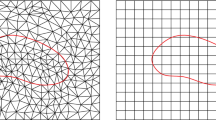Abstract
A residual type a posteriori error estimator is presented and analyzed for Weak Galerkin finite element methods for second order elliptic problems. The error estimator is proved to be efficient and reliable through two estimates, one from below and the other from above, in terms of an \(H^1\)-equivalent norm for the exact error. Two numerical experiments are conducted to demonstrate the effectiveness of adaptive mesh refinement guided by this estimator.


Similar content being viewed by others
References
Ainsworth, M.: Robust a posteriori error estimation for nonconforming finite element approximation. SIAM J. Numer. Anal. 42(6), 2320–2341 (2005)
Alonso, A.: Error estimators for a mixed method. Numer. Math. 74(4), 385–395 (1996)
Carstensen, C.: A posteriori error estimate for the mixed finite element method. Math. Comput. 66, 465–476 (1997)
Chen, L.: \(i\)FEM: An integrated finite element methods package in MATLAB. University of California at Irvine, Technical Report (2009)
Chen, L., Holst, M., Xu, J.: Convergence and optimality of adaptive mixed finite element methods. Math. Comput. 78, 35–53 (2009)
Chen, L., Yie, X., Wang, J., Wang, Y.: Multilevel preconditioners for weak Galerkin methods, In preparation (2013)
Chen, Z., Dai, S.: On the efficiency of adaptive finite element methods for elliptic problems with discontinuous coefficients. SIAM J. Sci. Comput. 24(2), 443–462 (2002)
Dari, V., Duran, E., Padra, R.G., Vampa, C.: A posteriori error estimators for nonconforming finite element methods. Math. Model. Numer. Anal. 30, 385–400 (1996)
Dörfler, W.: A convergent adaptive algorithm for Poisson’s equation. SIAM J. Numer. Anal. 33, 1106–1124 (1996)
Dryja, M., Sarkis, M.V., Widlund, O.B.: Multilevel Schwarz methods for elliptic problems with discontinuous coefficients in three dimensions. Numer. Math. 72(3), 313–348 (1996)
Duran, R.G.: Mixed Finite Element Methods. Class Notes (2007)
Girault, V., Raviart, P.: Finite Element Methods for Navier-Stokes Equations: Theory and Algorithms, volume 5 of Springer Series in Computational Mathematics. Springer, Berlin (1986). 87:52227
Kellogg, R.B.: On the Poisson equation with intersecting interfaces. Appl. Anal. 4(2), 101–129 (1974)
Kossaczky, I.: A recursive approach to local mesh refinement in two and three dimensions. J. Comput. Appl. Math. 55, 275–288 (1994)
Mitchell, W.F.: A comparison of adaptive refinement techniques for elliptic problems. ACM Trans. Math. Softw. 15(4), 326–347 (1989)
Mu, L., Wang, J., Wang, Y., Ye, X.: A weak Galerkin mixed finite element method for Biharmonic equations. arXiv:1210.3818 (2012)
Mu, L., Wang, J., Wei, G., Ye, X., Zhao, S.: Weak Galerkin method for the elliptic interface problem. J. Comput. Phys. doi:10.1016/j.jcp.2013.04.042 (2013)
Mu, L., Wang, J., Ye, X.: A weak Galerkin finite element method with polynomial reduction. arXiv:1304.6481 (2012)
Mu, L., Wang, J., Ye, X., Zhang, S.: A \(C^0\)-weak Galerkin finite element method for the biharmonic equation. arXiv:1212.0250 (2012)
Mu, L., Wang, J., Ye, X., Zhao, S.: Numerical studies on the weak Galerkin method for the Helmholtz equation with large wave number. arXiv:1111.0671 (2011)
Petzoldt, M.: A posteriori error estimators for elliptic equations with discontinuous coefficients. Adv. Comput. Math. 16(1), 47–75 (2002)
Verfürth, R.: A Review of a posteriori Error Estimation and Adaptive Mesh Refinement Techniques. Wiley Teubner, Chichester and Newyork (1996)
Wang, J., Ye, X.: A weak Galerkin finite element method for second-order elliptic problems. J. Comput. Appl. Math. 241, 103–115 (2013)
Wang, J., Ye, X.: A weak Galerkin mixed finite element method for second-order elliptic problems. Math. Comp., to appear (2013)
Author information
Authors and Affiliations
Corresponding author
Additional information
Long Chen: This research was supported in part by National Science Foundation Grant DMS-1115961 and in part by Department of Energy prime award # DE-SC0006903.
Junping Wang: The research of Wang was supported by the NSF IR/D program, while working at National Science Foundation. However, any opinion, finding, and conclusions or recommendations expressed in this material are those of the author and do not necessarily reflect the views of the National Science Foundation.
Xiu Ye: This research was supported in part by National Science Foundation Grant DMS-1115097.
Rights and permissions
About this article
Cite this article
Chen, L., Wang, J. & Ye, X. A Posteriori Error Estimates for Weak Galerkin Finite Element Methods for Second Order Elliptic Problems. J Sci Comput 59, 496–511 (2014). https://doi.org/10.1007/s10915-013-9771-3
Received:
Revised:
Accepted:
Published:
Issue Date:
DOI: https://doi.org/10.1007/s10915-013-9771-3
Keywords
- Weak Galerkin
- Finite element methods
- Discrete weak gradient
- Second-order elliptic problems
- A posterior error estimate




